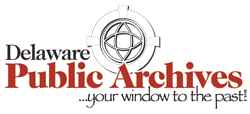
As the repository for records of Delaware state and local governments, the Delaware Public Archives contains thousands of documents and other materials that can help with researching one’s genealogical roots. Among these records are census materials, vital statistics including birth, death, and marriage records; tax assessments, probate/estate records, land deeds, and military records.
The Delaware Public Archives also preserves a large amount of genealogically related materials that were of private origin. These records include family histories, bible records, church records, manuscript genealogies, and newspapers.
Search our collection descriptions in the Delaware Public Archives Portal and browse our digital content via CONTENTdm, YouTube, and Flickr.
The mission of the Delaware Public Archives is three-fold:
The Archives holds more than 95,000 cubic feet of government records and historical documents.
We are dedicated to continuously reviewing and enhancing our descriptive practices to incorporate more respectful and inclusive terminology when possible. Please see our Harmful Content Advisory for more about these efforts.
You are cordially invited to make use of these valuable historical resources and explore Delaware’s past, from early settlement to recent times.
Since its inception, the Archives has preserved the records of the executive, legislative, and judicial branches of Delaware’s state government.
Executive branch records include the public papers of Delaware’s governors, the official register of gubernatorial actions, documentation for the activities of all executive branch agencies, and records documenting state involvement in military affairs.
Legislative branch records include enrolled bills, administrative papers, minute books and journals of the General Assembly from the 18th century to the present, and sound recordings of floor activities dating from the 1960’s to the present legislative session.
Judicial branch records include case files and docket books documenting the decisions and activities of Delaware’s state courts from the colonial period through the modern era.
Included here are the records of the Court of General/Quarter Sessions, Oyer and Terminer, Orphans’, Common Pleas, Superior, Supreme, Chancery, Justice of the Peace, and other miscellaneous courts.
A portion of the Archives’ holdings consists of county and municipal records dating from the late 17th century. These records generally consist of minutes and financial data; land records including deeds, warrants, and surveys; probate records including inventories, wills, and administrations; and tax assessment records. Other county holdings document activities in the areas of health and human services (through the records of the Trustees of the Poor) and transportation (through the use of road papers).
With a few exceptions, the municipal records in the custody of the Archives date from the second half of the 19th century and cover most of Delaware. They generally include minutes and ordinances; reports, correspondence, project files, and other items deemed to be of lasting value. Among the notable records are those from the City of Wilmington which date from 1771.
Although the official records of the government at all levels in the state contain useful genealogical information, the Archives has also collected genealogical materials from other sources. Federal census schedules for the years 1800-1880 and 1900-1920 are available on microfilm. (For more information see our brochure on census records.)
Items of private origin include the Reverend Joseph Brown Turner Genealogical Collection of research and correspondence concerning more than one thousand Delmarva families; the Walter G. Tatnall Collection of Delaware tombstone records; and the WPA transcribed church records. We also hold a large collection of privately compiled and donated family histories and genealogies.
Over 800,000 prints, negatives, slides, and lantern slides document most areas of Delawarean life and all regions of the state. Dating from the 1850s to the near present, most photographs are from about 1920 to 2000. Audiovisual holdings include motion pictures, video tapes, audio tapes, compact disks, wax cylinders, and phonographs.
Many of the older records of the Archives have been converted to microfilm for preservation and convenience of use. Over 15,000 rolls of film are available for self-service. Special research areas are set aside for viewing microfilm.
The Archives holds a few private papers of distinctive Delawareans including George Read, Caesar Rodney, and John M. Clayton. Prominent among these manuscript holdings are the Ridgley Papers, the John Dickinson Collection, and the Private Accounts Collection which includes business records of storekeepers, farmers, and craftsmen dating from the 18th century.
The Archives houses birth records which are more than 72 years old, and marriage records older than 50 years, and death records more than 40 years old. (More recent records are maintained by the Office of Vital Statistics).
Although official vital statistics were not consistently recorded until 1913, the Archives has vital statistical information for years prior to 1913, collected from various sources.
The Archives maintains a library of Delawareana. The collection includes state publications, books, genealogies, pamphlets, maps, and newspaper clippings.
Copying and scanning services are available for paper, photograph, and microfilm records. Fees for copying are based on actual cost and are subject to change. Self-service microfilm copying and scanning are available in the Research Room. You may also use your smartphone to take pictures of documents, books, photographs after checking with the reference archivist first. Some size restrictions exist for oversized items which require special arrangements for copies. Due to the fragile nature of many items, we reserve the right to determine the form of copying.
Preservation of historical records is part of the mission of the Delaware Public Archives. Because ink may accidentally but permanently destroy a record, pens are prohibited in our facility. Pencils must be used by researchers for taking notes and recording references.
If you have material you are interested in donating to the Archives, please view our Donations and Accessioning page.
If you would like to learn more about how the Archives preserves records, please view our Preservation Basics page.